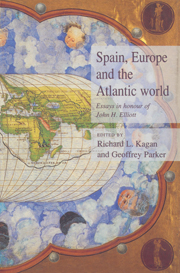Book contents
- Frontmatter
- Contents
- Notes on contributors
- Acknowledgements
- List of abbreviations
- Sir John Elliott: an appreciation
- Introduction
- PART I Power and propaganda: the world of the court
- PART II The pattern of society: community and identity in Habsburg Spain
- 4 Toledanos and the kingdom of Granada, 1492–1560s
- 5 Castile, Spain and the monarchy: the political community from patria natural to patria nacional
- 6 Aragonese constitutionalism and Habsburg rule: the varying meanings of liberty
- 7 Patriotism in early modern Valencia
- 8 The mental world of Jeroni Pujades
- 9 Centring the periphery: the Cerdanya between France and Spain
- PART III Spain and its empire
- Index
7 - Patriotism in early modern Valencia
Published online by Cambridge University Press: 04 August 2010
- Frontmatter
- Contents
- Notes on contributors
- Acknowledgements
- List of abbreviations
- Sir John Elliott: an appreciation
- Introduction
- PART I Power and propaganda: the world of the court
- PART II The pattern of society: community and identity in Habsburg Spain
- 4 Toledanos and the kingdom of Granada, 1492–1560s
- 5 Castile, Spain and the monarchy: the political community from patria natural to patria nacional
- 6 Aragonese constitutionalism and Habsburg rule: the varying meanings of liberty
- 7 Patriotism in early modern Valencia
- 8 The mental world of Jeroni Pujades
- 9 Centring the periphery: the Cerdanya between France and Spain
- PART III Spain and its empire
- Index
Summary
Early modern Europe was a mosaic of overlapping political units, of city states and lordships and multinational empires. Human geography dictated solidarities which might be vaster or smaller than the political boundaries, while ties of religion or caste or clientage constituted alternative focuses of loyalty to those of the emerging state. The Spanish monarchy, with its multi-ethnic and multicultural character, constitutes an interesting example of the conflicting forces at work in this period. The revolts of the 1640s in Catalonia, Portugal, Sicily and Naples have provoked questions about the nature of the modern state, and its ability, or failure, to ground political allegiance on firmer social and cultural supports. A sense of pride in the local patria was certainly well developed. In that slow-moving, pre-industrial world men were more keenly aware than today of differences in house styles, dress, plants, vernacular tongues shading off into dialects – the whole complex of factors which might shape a national character, about which the sixteenth-century writers were not slow to speak. On the other hand, in an age in which cosmographies, those intriguing blends of history and geography, were the chief forms of presenting one people to another, the awareness of collective identity was grounded in a shared tradition of law, religion and historical memory. Good government, in order to maintain the tradition in its pristine form, was the essence of ‘patriotism’, as the early modern period understood the term.
- Type
- Chapter
- Information
- Spain, Europe and the AtlanticEssays in Honour of John H. Elliott, pp. 188 - 210Publisher: Cambridge University PressPrint publication year: 1995
- 2
- Cited by



